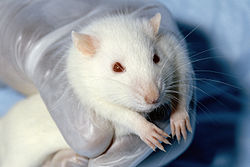Vaccine targets obesity in rats
Sunday, August 6, 2006

American scientists have successfully used a vaccine to slow down weight gain in an animal model, as reported in the scientific journal Proceedings of the National Academy of Sciences (PNAS). The vaccinated rodents showed less increase in body weight even though they ate as much as their non-vaccinated counterparts. If supported by further studies, vaccination could become a promising new tool in the battle against the obesity pandemic, although application in humans is probably not for the near future.
The research team led by Dr. Kim Janda of the Scripps Research Institute in La Jolla, California, vaccinated male rats using three different haptens (small molecules which can elicit an immune response when attached to a large carrier such as a protein). Vaccination teaches the immune system to recognise and destroy a target.
In this experiment, the target was ghrelin, a hormone produced by the stomach in both humans and rodents. Ghrelin stimulates appetite and promotes the build-up of fat tissue. It was also previously shown that mice with the ghrelin gene knocked out (makes the mice unable to produce ghrelin), expend more energy and break down their fat stores more easily. In this study, vaccinated rats retained the same appetite, but the other effects were altered resulting in a lesser weight gain. The fact that the appetite remained unchanged came as a surprise to the investigators, but the idea of being able to eat the same and put on less weight is intriguing.
The rats in this study were on a low-energy, low-fat diet quite unlike the typical diet of people with obesity, where energy-rich snacks predominate. It remains uncertain whether these findings could be extended to that setting. The group is already planning further studies to ascertain the therapeutic potential of the new vaccine. The question also remains whether it will prove effective in already obese subjects, and the group plans further investigations into this matter.
Vaccines are generally used to combat infectious diseases, but recently their field of application has been expanded to unconventional areas, drug addiction for example. One of the possible advantages of this approach to the field of obesity medicine, is that vaccination could promote long term effects. This could supersede the need for chronic intake of drugs sometimes associated with severe adverse effects (such as the banned Fen-phen).
Sources
edit- Eric P. Zorrilla, Shinichi Iwasaki, Jason A. Moss, Jason Chang, Jonathan Otsuji, Koki Inoue, Michael M. Meijler, and Kim D. Janda. "Vaccination against weight gain" — Proceedings of the National Academy of Sciences, August 4, 2006
- "Scientists take step toward obesity vaccine. Studies on rats found vaccinated animals could eat without gaining weight." — MSNBC, August 1, 2006
- David Biello. "Vaccine Fights Fat in Rats" — Scientific American, August 1, 2006
- "Spuit je slank" — De Standaard, July 31, 2006 (Dutch)
| This page has been automatically archived by a robot, and is no longer publicly editable.
Got a correction? Add the template {{editprotected}} to the talk page along with your corrections, and it will be brought to the attention of the administrators. Please note that the listed sources may no longer be available online. |